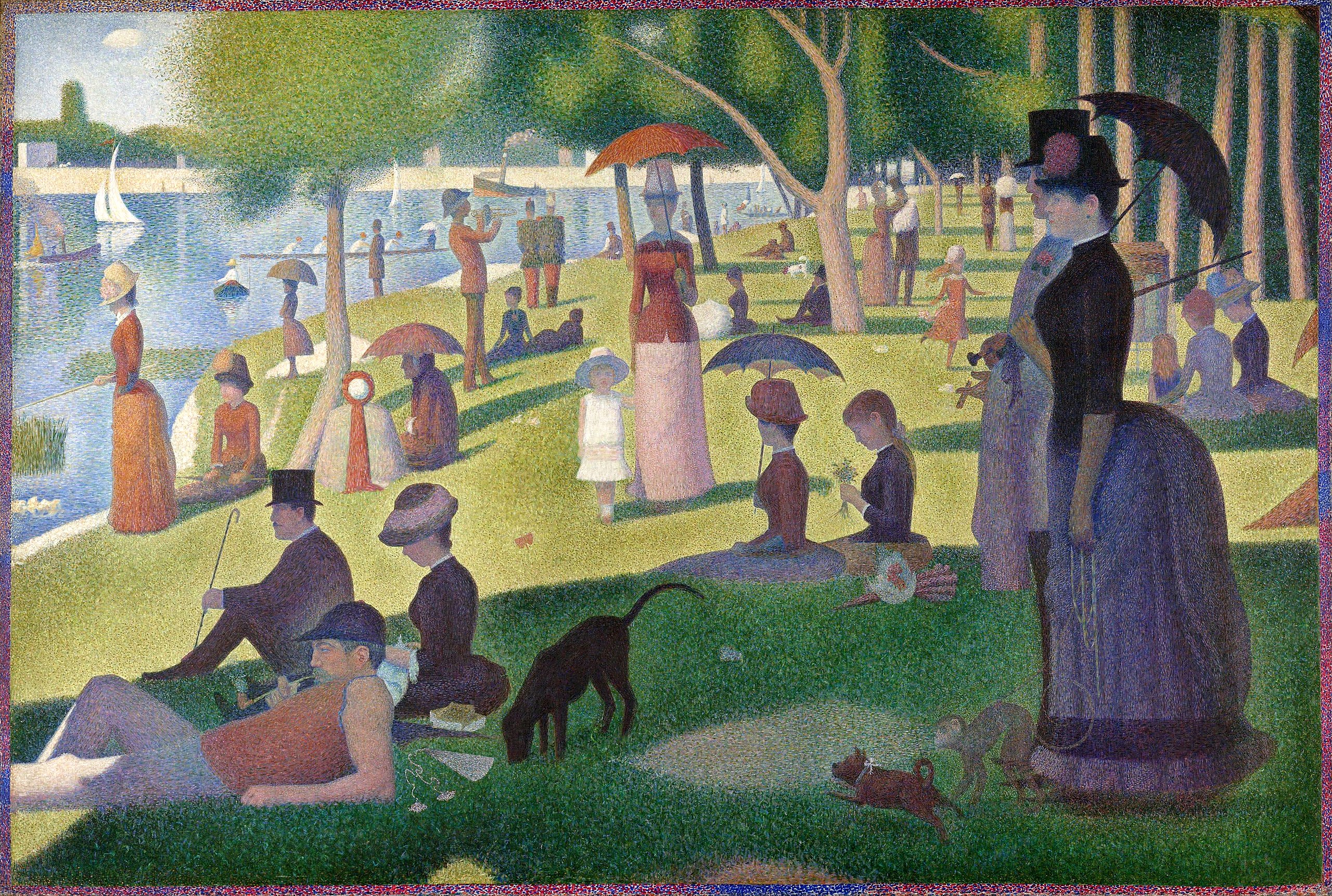Ferris Bueller’s Lessons on Mindfulness

Shane Ledford with his dad at Wrigley Field in 2001
Guest Post by Shane Ledford, CMT-200, CYT-200
Given that today, June 5th is Ferris Bueller Day (and, I would understand if you didn’t realize there was such a thing), I thought I would continue my ongoing discussions of seeing mindfulness references in pop culture.
So, then…what does the 37-year-old coming-of-age teen comedy Ferris Bueller’s Day Off have to teach about being in the moment?
Anyone?
Bueller? Bueller? Bueller?
Plenty.
(And, as always, be aware there will be spoilers ahead.)
The movie begins with Ferris lying in bed pretending to be sick. His parents are genuinely concerned and convinced by his overdramatic performance, and both of them insist that he stay at home and not go to school. As soon as they leave for work, Ferris breaks the fourth wall by looking into the camera at us, the implied audience, and says, “They bought it.” This demonstrates that Ferris is aware that he knows he is a character in a movie, and he continues to chat at the screen to us many times through the entire film. It is as if he is the only one conscious of his true existence in the film’s “reality” as no other character talks directly to us. This very early revelation shows he is completely mindful of his actuality, and much like what Jacques said in William Shakespeare’s As You Like It, he knows “all the world’s a stage, and all the men and women are merely players.”
Ferris then lets the audience know why he is feigning sickness when he opens his bedroom curtains and reveals a beautiful blue sky outside and asks us, “How could I possibly be expected to handle school on a day like this?” Shortly after this he offers his now-familiar inspirational wall art and meme quote: “Life moves pretty fast. If you don’t stop and look around once in awhile you could miss it.” So, Ferris is not skipping school because he is a lazy slacker. He is skipping school because he is aware and accepts that moments in life are precious, and wants to embrace that as much as he can before it passes him by. Carpe Diem. Stop and smell the roses. Make the most of today. Mindfulness 101.
Life moves pretty fast. If you don’t stop and look around once in awhile you could miss it. – Ferris Bueller
Now, before I go any further, I should mention that I do not condone truancy, lying to parents (and others), and some of the other questionable means to an end hijinks that go on in this film. But it is a film. And like most films, this is a form of escapism where we can imagine being somewhere or someone else vicariously for a few hours. So, while the film is fantasy, it still offers an underlying question based in reality for the audience: IF you could get away with it, wouldn’t you rather play hooky from school or work and enjoy a beautiful day doing something else (and still be able to graduate, have your job, pay the bills, etc.)? Oh, yeah.
Ferris calls his best friend, Cameron Frye, to join him on this living-in-the-moment-of-the-day journey. As the movie develops, I see this initial phone call as a gesture of genuine caring and from a pure heart more than Ferris just needing an accomplice with his shenanigans. Cameron says he can’t go because he is at home and is (unlike Ferris, “actually”) sick and feels like he is dying. Ferris replies, “That’s all in your head. You’re not dying. You just can’t think of anything good to do.”
This would not be the first time Ferris explains to Cameron (or as an aside to audience) what is really going on with Cameron. Ferris knows Cameron better than Cameron knows himself. Cameron suffers from extreme anxiety which Ferris theorizes is probably what is making him sick. This anxiety and subsequent depression Cameron feels is from wanting to live up to his parents’ (and society’s) expectations, but he is not really sure how to go about it and doubts his abilities. Ferris knows the remedy for Cameron’s illness that day: Don’t take life (or oneself) so seriously and have some fun.
It should be noted that Ferris and Cameron come from upper middle class families. A common theme in 1980’s teen movies (such as Risky Business and The Breakfast Club) were the (many times unreasonable) demands these upper middle class parents in films would put on their high school children… and the children would rebel, or have breakdowns. While this definitely was a commentary against the excesses of 1980’s capitalism and materialism, it is a theme that has been in many movies before (such as Rebel Without a Cause and The Graduate). So, in this film, Ferris uses this upper middle class privilege to escape for a different desired life, and Cameron surrenders unwillingly to the privilege (and thus leading to his anxiety). Ferris doesn’t want to be what society thinks he should be. He wants to be a free spirit and not give into conformity by adding, “‘Ism’s,’ in my opinion are not good. A person should not believe in an ‘ism.’ They should believe in themself.”

Photo by Sam Pearce-Warrilow
After convincing the reluctant Cameron to join him on the day off, Ferris then suggests they drive Cameron’s dad’s treasured 1961 Ferrari. (Ferris doesn’t have a car, and Cameron feels his car is unreliable.) Cameron emphatically states, “My father loves this car more than life itself.” To which Ferris responds, “A man so out of whack doesn’t deserve such a fine automobile.” Ferris doesn’t want to take the Ferrari because it IS a Ferrari, he wants to take it for the experience one can HAVE in a Ferrari (especially with the top down). Ferris buys into the notion of “the best things in life aren’t things.” He is more into the experiences.
Cameron agrees (once again) after Ferris says, “C’mon, live a little.” And then adds, “The question isn’t what are we going to do. The question is what AREN’T we going to do.” While definitely nervous and anxious, Cameron is also intrigued about the notion of getting out of his comfort zone. In fact, later Ferris tells the audience, “I caught Cameron digging the ride (in the Ferrari) once or twice. It’s good for him. It teaches him to deal with his fear.”
From here, Ferris and Cameron pick up Ferris’ girlfriend, Sloane Peterson, at school (after an elaborate scheme of them pretending to be her father and that her grandmother died…again), and then the best friends embark on a journey of self-discovery via the landmarks of downtown Chicago and Ferris’ sage advice.

Photo by Benjamin Suter
While visiting the Sears (now Willis) tower, which, at that time, was the tallest building in the world, the trio lean out onto the glass windows of the indoor observation floor and peer at the city far below. Ferris observes that, “Anything is peaceful from 1,353 feet.” This reminds me (again) of how preconceived differences can melt away when we broaden our visual perspective… especially from height. People all look the same from high above: Peaceful and in harmony. And, if we zoom our vision out further and higher (both literally and figuratively) we no longer see people, cities, states, countries or any imaginary borders that divide us…we just see Earth.
Later, at Wrigley Field during a Cubs baseball game (where, as previously linked above, is how the date of Ferris Bueller Day was determined), Ferris mentions, “Hey, Cameron, do you realize if we played by the rules right now we would be in gym?” Ferris and Cameron don’t seem to be the types that would enjoy gym class, and this was another reminder that the moment they were in was much better than the moment they could have (or should have) been in.
As mentioned earlier, not all of us can (or should) play hooky from school and take the day off and go to a ball game or whatever. Ferris’ fantasy life has no responsibility or consequences. Ours does. However, mindfulness invites us to maybe check in with ourselves throughout the day and ponder if we could be doing something more beneficial than what we are typically accustomed or conditioned to. So, for example, if overwhelmed at work, yet still fortunate to have a 30 minute lunch break, perhaps enjoy your lunch outside on a nice day as opposed to sitting at your desk and scrolling through social media at the same time. It is the same 30 minutes… with just a refocus on how you spend it. Maybe enjoy your morning coffee at home without the news on (or other distractions)…even if it is only for 5 minutes… as that might be the last quiet “me” time you have for awhile. Perhaps choose to read a book or maybe do some journaling as you wind down in the evening instead of binge-watching one more show.

Photo by Heather Maguire
I might also mention that Wrigley Field was the last major league ballpark to install lights for the addition of night games in 1988. So, at the time of this movie, anyone (and not just Ferris and his friends) that wanted to see a Cubs baseball game HAD to go during the day (and take off work or school or whatever). And, before that, all major league baseball games were played during the day. So, everyone you see in those old black and white photos wearing suits, dresses, and hats at baseball games should have been (or could have been) doing something else, but they chose to be at a ballgame (maybe we should petition to get rid of night games).
For me, besides the Wrigley Field moment (which includes Ferris catching a foul ball that he serendipitously needs at the end of the film), the scene that resonates with me the most is when they are in the Art Institute of Chicago. While Ferris and Sloane are sharing a romantic moment off to the side, Cameron is mesmerized by the famous painting, A Sunday on La Grande Jatte—1884 by Georges Seurat. Out of all the pieces of art in the institute, why is Cameron fixated on this one? Well, much like our trio, the piece of art shows all different types of people outside enjoying a beautiful day. And, since it is a famous example of pointillism, the camera zooms in a few times and eventually reveals indistinguishable dots of paint. This illustrates what Cameron is contemplating in his meditative trance: going from the physical outside and looking more closely on the inside within. Much like the cluster of dots in the painting, Cameron is looking deeply into himself.. and focusing on the cells that make up his true existence. He is starting to rethink his life, and his thoughts (as we will see later) remind me of what Mihaly Csikszentmihalyi says in his book, Finding Flow:
It is how we choose what we do, and how we approach it, that will determine whether the sum of our days adds up to a formless blur, or to something resembling a work of art. – Mihaly Csikszentmihalyi

A Sunday on La Grande Jatte, Georges Seurat, 1884
Next up on the agenda is the now-famous downtown Chicago parade scene, where Ferris hops on a float and lip syncs Wayne Newton’s Danke Schoen. It is his literal way (in German) of thanking his friends for the day together, and dedicates the song to Cameron, “Because he doesn’t think he had seen anything good today.” Ferris knows that he has already made a positive influence on Cameron, and this gives Ferris reciprocal joy.
Cameron then tells Sloane, “As long as I’ve known him everything works for him. There’s nothing he can’t handle.” Sloane then asks, “What do you think Ferris is going to do (in the future)?” To which Cameron responds with a smile, “He is going to be a fry cook.” Cameron seems to admire the freedom Ferris has about not getting caught up in the unknown future. Sure, Ferris might go to college or he might be a fry cook. He might marry Sloane or he might not. Who knows? The audience doesn’t. Ferris doesn’t. Only the unknown future knows what is in store for him, and as Yoda said in The Empire Strikes Back, “Always in motion is the future.” And that is okay with Ferris.
Immediately after the quip about Ferris being a fry cook, the first chords of the Beatles’ Twist and Shout blares through the parade, and Ferris starts lip syncing, “Well, shake it up, baby, now!” This is a direct response to Cameron and Sloane’s dialogue as Ferris is content with a life of shaking things up from what is expected. And… this shaking things up is infectious to all around. The parade participants and crowd (and real workers nearby) go into a dancing frenzy. No one seems to mind that a teenager jumped onto a float and somehow started getting the entire downtown to dance. The means justify the end.
I won’t go into a long exposition about the unbelievable things that happen with the Ferrari in the last parts of the film… except to say the events are necessary for character growth… in Cameron. After (somewhat) faking a catatonic state in the bottom of a swimming pool, Ferris pulls him to the surface, shakes him, and yells, “Cameron wake up!” This can be seen as Ferris’ desire for not only for Cameron to wake up physically… but also consciously. Cameron opens his eyes, smiles, and says, “Ferris you’re my hero.”
Later, while reflecting on that situation and the events that led to it, Cameron says, “I was like meditating. I started to watch myself from inside.” This, to me, goes back to him silently gazing at the painting (and himself) in the Art Institute. Cameron also adds, “I realized it was ridiculous to be afraid… worrying about everything… I’m tired of it.” He then smiles (again), “It’s the best day of my life.”
When going home, Sloane asks Ferris if Cameron is going to be alright. Ferris replies, “For the first time in his life he will be okay.” Sloane smiles at him and says, “You knew what you were doing when you woke up this morning.” While he wasn’t necessarily sure of how the day would turn out, Ferris woke up knowing he was just going to be in the moment and hopefully show others how to have fun and not take life so seriously.
I once considered Ferris a slacker, but, over time, I started to see him more as the Trickster archetype from Joseph Campbell’s The Hero With a Thousand Faces. But now, I consider him even more as the Mentor. The Teacher. The one that guides the traveler(s) on the journey with wisdom and a magical gift. Ferris’ gift is the mantra he said earlier (and also closes out the film with): “Life moves pretty fast. If you don’t stop and look around once in awhile you could miss it.”
Ferris didn’t need saving. He was there to save us.












Loved it, Shane–as I have always loved this movie!
Thank you, Karen! Glad you liked it (and the movie 😎😍). It is now one of newly rediscovered favorites, too. 🙏